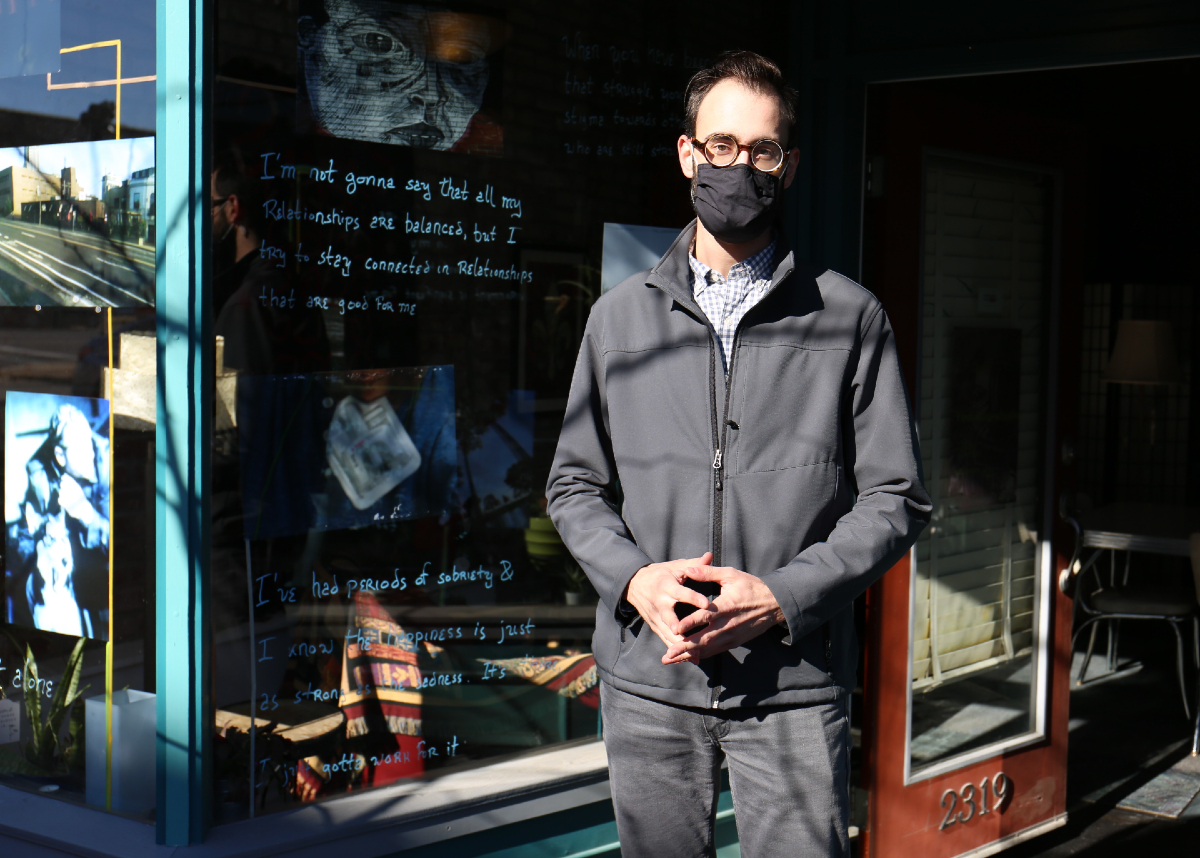Social Work Researchers Use Photovoice to Help People Cope With Stress and Substance Abuse
Supported by the Doerr Center for Social Justice, doctoral candidate Nathaniel Dell, AM, MSW, LCSW and Brandy Maynard, Ph.D., MSW, Associate Professor at the School of Social Work, co-led a photovoice study at Places for People, Inc, a Certified Community Behavioral Health Center in St. Louis where Dell serves as Director of Research and Evaluation.
The exhibit, in the window front of Red Chair Studios at 2319 Cherokee Street in St. Louis, is available for viewing until November 28th.
The project, “Standing in the balance: A photovoice exhibit on coping with traumatic stress and substance use,” seeks to understand how individuals living with co-occurring traumatic stress and substance use safely cope.
Photovoice is a form of community based participatory research where people take photos of their day-to-day lives to show their realities, discuss the meanings of those photos with researchers and share their work with other stakeholders to promote positive change in the community. Participants expressed their desire to communicate through the project to others struggling with similar experiences in an effort to show that there are many ways of dealing with distress.
It is important to show, like in this project, times where people are able to transcend the limitations they've encountered personally and in their environments to realize a more ideal life,” Dell said.
The six participants of the study are or were part of ‘Seeking Safety’ groups which use present-focused counseling to address both trauma and substance abuse.
Participants in ‘Seeking Safety’ learn strategies to cope with distress in the moment by discussing thinking patterns and trauma triggers, focusing on skill building and integrating those skills into their everyday life. The goal is for participants to enact what safety means to them in their lives and communities.
Originally scheduled for April 2020, the COVID-19 pandemic pushed back the community exhibition, but Dell says that in a way, it makes the photographs and stories of participants resonate even more.
Participants' understanding on how to cope with distress is even more relevant for a general audience, given the pandemic. Traumatic events can threaten people’s conscious or unconscious assumptions of a “just world” – that “bad things only happen to bad people” – or the belief that enough of the world feels stable and predictable,” Dell said.
The exhibit also showcases accompanying objects that participants paired with their photos. Dell and the team then chose quotes from the interviews with permission from the participants to create the installation.
I was really moved by the images the participants captured and hearing their voices through their photographs and the descriptions of what the images represented for them,” Brandy Maynard, MSW, Ph.D. said.
As part of the study, researchers are asking participants to share their impressions of the exhibit by taking a short, anonymous survey.
Dell will be presenting research from the study, co-authored by Maynard and Kyle Brandt-Lubart, a therapist and coordinator for the Community Arts Program at Places for People, at the Council on Social Work Education (CSWE) 2020 Annual Program Meeting and the Society for Social Work & Research 25th Annual Conference.
-----
Nathan Dell is a current doctoral student in the Social Work program in the College of Public Health and Social Justice at Saint Louis University. He plans to explore ‘personality functioning and behavioral health comorbidities among homeless adults’ as part of his dissertation research.
About the College for Public Health and Social Justice
The Saint Louis University College for Public Health and Social Justice is the only
academic unit of its kind, studying social, environmental and physical influences
that together determine the health and well-being of people and communities. It also
is the only accredited school or college of public health among nearly 250 Catholic
institutions of higher education in the United States.
Guided by a mission of social justice and focus on finding innovative and collaborative solutions for complex health problems, the College offers nationally recognized programs in public health, social work, health administration, applied behavior analysis, and criminology and criminal justice.
